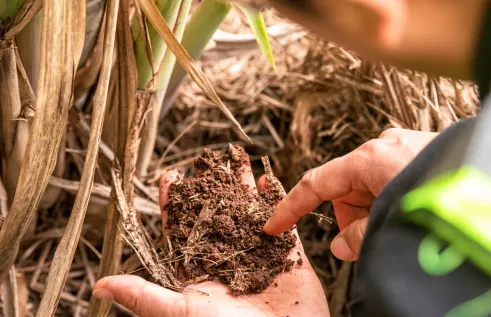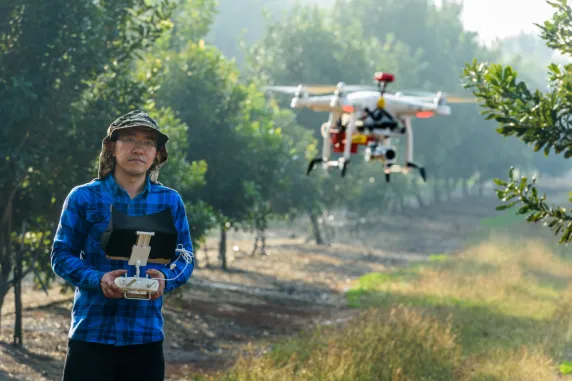Group leader
Professor of tropical cropping systems, Chengyuan (Stephen) Xu has a passion for enhancing the sustainability and resilience of farming communities. With over 15 years of experience in plant ecophysiology, his research focuses on improving crop production by investigating crop physiological responses to climate and resource availability and applying carbon farming and precision agriculture technologies, with experience in diverse crops, including peanuts, sugarcane, macadamias, blueberries, dragon fruit, exotic mushrooms, and sweet potato. Professor Xu is a leader in fostering regional industry development and establishing emerging crops to diversify rural economies. With cross-disciplinary networks in computer science, engineering, economics, rural supply chain, and policy across China, USA, Vietnam, and Pacific Islands, Professor Xu has broad international and multidisciplinary collaborations.
Our focus
Our group is at the forefront of multidisciplinary research aimed at enhancing the production, sustainability, and resilience of tropical cropping systems. With a strong foundation in crop physiology, agronomy, and soil science, we collaborate extensively with professionals from diverse fields such as ecology, environmental science, computer science, engineering, economics, rural supply chains, and policy development.
Our primary mission is to drive positive change in tropical cropping systems, with a particular focus on fostering emerging crops and new industries to diversify and strengthen rural economies. Key research areas in our group include:
Crop Physiological Responses: We investigate how crops respond to climatic factors and variations in resource availability, ensuring that farmers can make informed decisions to optimize their yields and manage risks effectively.
Carbon Farming: We explore innovative approaches to enhance soil fertility and crop yields through carbon farming, contributing to sustainable agricultural practices and mitigating the effects of climate change.
Precision Agriculture: Our group pioneers the adoption of precision agriculture techniques and technologies to enhance the sustainability of horticultural farming systems. We aim to make agriculture smarter and more efficient.
Circular Economy: We actively promote the use of agricultural waste in the creation of new products, thus contributing to a circular economy while integrating domestic agricultural supply chains.
We are committed to industry-focused applied research. We understand the challenges faced by the agricultural sector and prioritize open communication and collaboration with industry stakeholders. We aspire to work closely with industry partners to develop large-scale, interdisciplinary projects that not only advance industry development but also push the boundaries of research and development. By engaging in meaningful dialogue, we gain valuable insights into the pain-points of our industry partners, enabling us to identify and develop potential opportunities for growth and innovation, and create a lasting impact on both the agricultural sector and academia.
Importance of this research
Enhancing the sustainability and resilience of tropical cropping systems is crucial for global food security and the livelihoods of millions. Our research group's work addresses this imperative by empowering farmers with insights into crop responses to climate variability and resource availability. Through initiatives like carbon farming and precision agriculture, we not only boost yields but also mitigate climate change impacts. By fostering new industries and advocating for circular economy practices, we diversify rural economies and promote sustainability. Our close collaboration with industry ensures that our research translates into practical solutions, driving innovation for the benefit of farming communities and the environment.
Current projects
Enhancing the resilience of the Northern Territory’s rain-fed cotton: A comprehensive approach to yield prediction and water management
Australian cotton offers high profitability and has potential to become a cornerstone crop in the Northern Territory (NT), where growth of cotton industry would build capacity and strengthen the whole agricultural sector. Unlike irrigated cotton in southern states, NT’s rain-fed cotton relies on wet season rainfall, making it less water-intensive but more vulnerable to unfavourable rainfall. However, our knowledge about water use of rain-fed cotton and potential impact of rainfall is limited. This project aims to enhance our understanding of the water use patterns and efficiency of rain-fed cotton in the Katherine and Douglas-Daly regions using a combination of physiological measurements, ground and soil sensors, and remote sensing. By integrating these data into numerical crop models, the project will predict rain-fed cotton yields, including under variable rainfall, addressing potential impacts. This knowledge may serve to guide supplementary irrigation in the future, further bolstering the resilience of the NT cotton industry.
Funded by the Department of Agriculture and Fisheries (DAF) of the Northern Territory Government (NTG) and the National Industry PhD Scholarship – Commonwealth Department of Education.
Using Cotton Grain and Cattle Waste to Grow Mushroom for Circular Economy
As the Northern Territory agriculture is experiencing significant expansion, a notable surge is anticipated in the cotton industry. Over the past years, the cotton crop production area has expanded to more than 10,000 hectares, and it is anticipated to reach 15,000 hectares in the coming years with the opening of a cotton gin factory near Katherine. Cotton crop waste, including stalks and leaves, cotton seed husks, and other by-products from the gin industry, can be repurposed as substrates for mushroom growth. This not only mitigates the environmental impact of waste disposal but also transforms these materials into valuable commodities. The synergistic relationship between the new cotton gin plant and the innovative mushroom cultivation project exemplifies the power of sustainable thinking. Together, we will turn waste into wealth, forging a path toward a more environmentally conscious and economically resilient future. This project is in collaboration with the Department of Agriculture and Fisheries (DAF) of the Northern Territory Government (NTG) and the Northern Territory Farmers Association (NT Farmers) as industry partners.
Funded by Cooperative Research Centre for Developing Northern Australia (CRCNA), and Research Training Program – Commonwealth Department of Education.
Monitoring Cotton Crop Production in the Northern Territory Using Remote Sensing
This project leverages remote sensing technologies to monitor cotton crop production across the Northern Territory (NT).
Remote sensing is a key tool in modern agriculture, offering non-destructive, cost-effective, and scalable solutions for tracking crop growth, health, and yield. Capturing detailed spectral and structural information enables continuous assessment of vegetation conditions over large areas.
Cotton farming in the NT faces unique challenges, including variable rainfall, extreme temperatures, and diverse soil types. Efficient monitoring and data-driven management are therefore essential to maximize yield and support sustainable production.
The project specifically examines the early establishment, growth, and yield of cotton using UAV-based multispectral imaging, vegetation indices, and structural trait analysis. The aim is to improve the accuracy of crop monitoring and provide practical insights to support the growth of the cotton industry in northern Australia.
Strategies to Mitigate High Soil Temperature Stress in Cotton: Impacts on Seedling Growth, Establishment and Soil Health
This project addresses one of the key challenges in northern cotton production — high soil temperatures that impact germination, early seedling establishment, and overall soil health. The research aims to develop sustainable strategies to support the emerging cotton industry in the Northern Territory.
The study focuses on understanding the effects of high soil temperature stress on cotton seed germination, seedling growth, and soil health, using controlled oven and pot trials to simulate field conditions. Findings from this research are helping to inform practical approaches for improving early crop establishment and long-term productivity.
The project contributes to the broader goal of supporting a sustainable and resilient cotton industry in northern Australia by providing data-driven insights and management strategies. This project is in collaboration with the Department of Agriculture and Fisheries (DAF) of the Northern Territory Government (NTG).
Funded by Cotton Research Development Corporation's (CRDC) Postgraduate Scholarship and Research Training Program – Commonwealth Department of Education.
Increasing on-farm labour productivity for sustainable production, nutrition and inclusive livelihood gains in Timor-Leste
The larger project investigates the labour productivity and nutritional yield associated with implementing new agricultural practices, including planting new varieties, microdosing of fertilisers and introducing mechanised land preparation and harvesting.
Contact the cropping systems group
Chengyuan (Stephen) Xu (徐承远)
Group leader
08 8946 7792 | 0423 261 276
stephen.xu@cdu.edu.au
CDU Casuarina Campus, Yellow 1, Level 1, Room 22

